
Fortune News | Apr 15,2023
Aug 29 , 2020
By HAGOS GEBREAMLAK ( FORTUNE STAFF WRITER )
The Ethiopian Institute of Agricultural Research has availed 28 new improved varieties of grains, vegetables, fruits, pulses and oilseeds, which are five to 10pc more productive compared to the seeds currently being used.
The Institute, which has been conducting research on yield gaps and adaptability for the past six years, released these hybrid seeds whose main features centre on productivity, quality and adaptability. The improved seeds passed through five evaluation stages: pre-trial, trial, extension trial, verification trial and national variety trial.
These seeds were tested to be adaptive and productive in lowland, midland and highland ecology, as well as in warmer and cooler agro-climatic areas.
They sowed six to nine times to check that the varieties met the desired results, according to Taye Tadesse (PhD), crop research director at the Institute.
"The seeds will also be a competent, effective and suitable input to agro-processing industries, the export market, food and nutrition enhancement," he said.
The Institute released five grains: wheat, barley, maize, sweet corn and teff; three pulses: bean, chickpeas and cowpeas: and three oilseed varieties. It also produced five vegetable varieties, two cotton hybrid seeds, one teffhybrid seed, and two-finger millet varieties.
The wheat varieties will be critical in filling the yield and ecological gaps, according to Taye.
"Wheat is one of the most critical crops in food security," he said. "Ultimately, seed improvements reduce poverty and ensure food security."
The barley seeds, one of which is for malt, focuses on tech-led industrial quality and quantity by partnering with breweries and other facilitators. The maize and sweet corn varieties are the most advanced in terms of yield, accounting for 12pc to 15pc increases in productivity.
“This is because maize is genetically more productive than other seeds,” said Taye.
However, all the released improved seeds are at least 10pc or more productive than the existing seeds, except for teff, according to Mandefro Neguse (PhD), state minister for Agriculture.
“The teffseed is only five percent more productive, because it is genetically less productive than other seeds,” said Mandefro.
The Institute plans to supply the seeds to farmers in the form of a pilot test through pre-extension and extension projects.
The Ministry of Agriculture, for its part, will be introducing the improved seeds to farmers and multiplying them in cooperation with public and private breeding enterprises, according to Mandefro.
“We're also initiating agricultural clusters in Arsi, Bale, Shewa, Gojjam, Raya, Hararghe, and others for seed multiplication and productivity increases,” he said. “There is a high demand for improved seeds from farmers.”
The country needs improved varieties because of its location, according to Jemal Abdulahi (PhD), assistant professor of plant science at Haramaya University.
"As it is located around the equator, it has various soil types, climatic conditions and topographies," he said. "This makes it more susceptible to crop diseases, pests and weeds."
Farmers should work with the inputs they are using like seeds, fertiliser and soil types properly to increase their production, recommended the expert.
“Sowing improved seeds without implementing this package accordingly will be in vain," said Jemal, who thinks that the government should also provide farmers with different types of fertiliser.
"There are various types that are suited for different soils across the country," he said. “The farmers have difficulty getting other fertilisers than urea and diammonium phosphate (DAP)."
The performance of the new varieties should also be followed up on by the farmers and government agencies, he added.
PUBLISHED ON
Aug 29,2020 [ VOL
21 , NO
1061]

Fortune News | Apr 15,2023

Radar | Oct 05,2019

Radar | Jul 27,2019

Radar | Sep 11,2020

Radar | Jul 15,2023

Radar | Jun 15,2024

Fortune News | Oct 01,2022

Radar | Apr 20,2019

Fortune News | Aug 01,2020

Fortune News | Nov 10,2024

Dec 22 , 2024 . By TIZITA SHEWAFERAW
Charged with transforming colossal state-owned enterprises into modern and competitiv...

Aug 18 , 2024 . By AKSAH ITALO
Although predictable Yonas Zerihun's job in the ride-hailing service is not immune to...

Jul 28 , 2024 . By TIZITA SHEWAFERAW
Unhabitual, perhaps too many, Samuel Gebreyohannes, 38, used to occasionally enjoy a couple of beers at breakfast. However, he recently swit...

Jul 13 , 2024 . By AKSAH ITALO
Investors who rely on tractors, trucks, and field vehicles for commuting, transporting commodities, and f...

Jun 28 , 2025
Meseret Damtie, the assertive auditor general, has never been shy about naming names...

Jun 21 , 2025
A well-worn adage says, “Budget is not destiny, but it is direction.” Examining t...

Jun 14 , 2025
Yet again, the Horn of Africa is bracing for trouble. A region already frayed by wars...

Jun 7 , 2025
Few promises shine brighter in Addis Abeba than the pledge of a roof for every family...